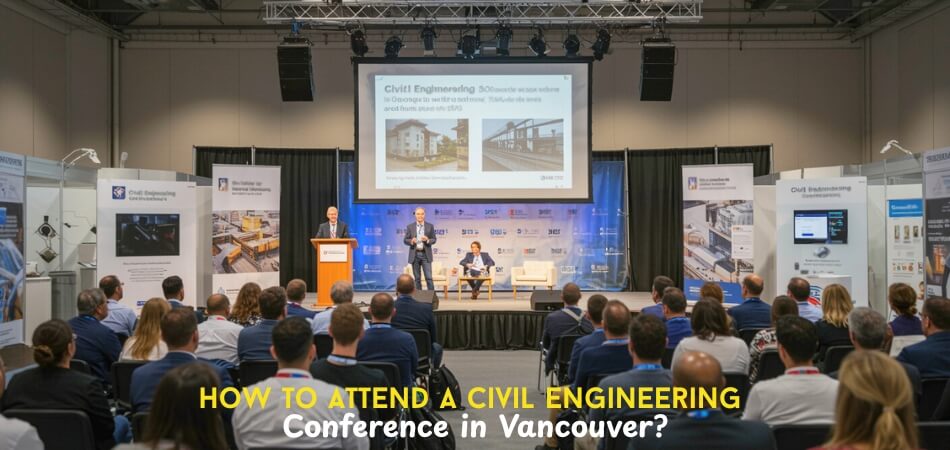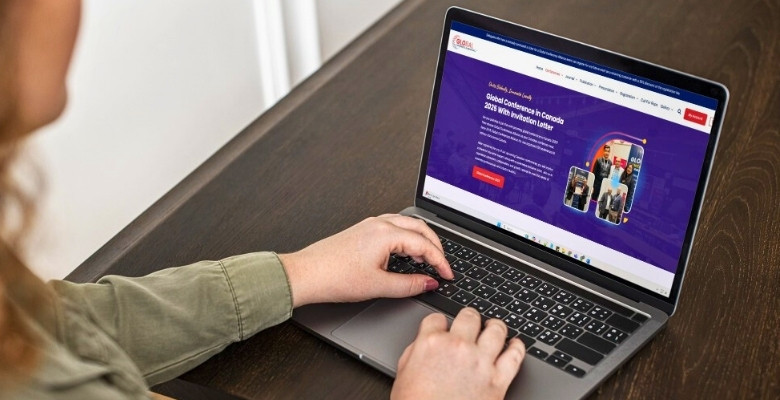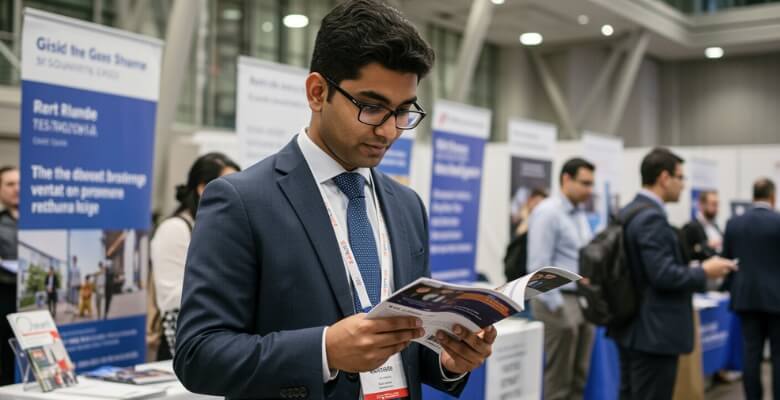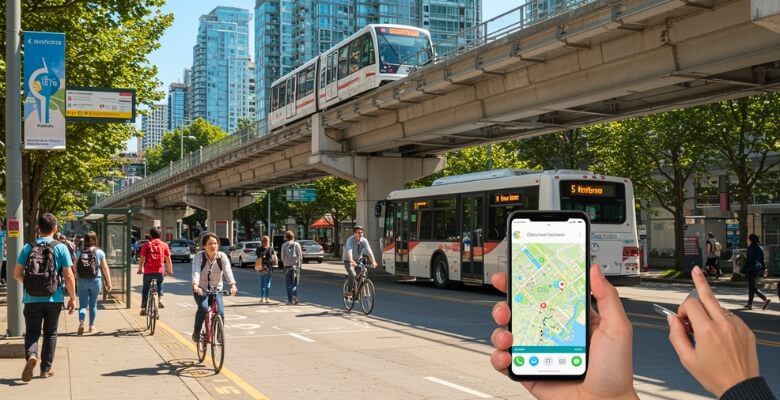Visualize yourself in a crowded conference center in Vancouver, surrounded by passionate civil engineers, groundbreaking infrastructure models, and inspirational keynote speakers. You’re finally here, but what steps brought you here? When you find yourself wondering: How to attend a civil engineering conference in Vancouver? —You’re exactly where you need to be.
To attend a civil engineering conference in Vancouver, begin by identifying a relevant event, complete the online registration, and pay the applicable fees. If you’re traveling from abroad, get an official invitation letter and apply for your visa as early as possible. Make travel arrangements, ensure all required documents are in order, and study the event schedule to make the most of every session.
Excited to learn more? Keep reading for a detailed, step-by-step guide to help you prepare for a smooth and impactful conference experience.
How to Attend a Civil Engineering Conference in Vancouver?
The experience of attending a civil engineering conference in Vancouver can be rewarding and fun. You’ll meet industry professionals, discover new ideas, and see the latest trends in civil engineering. But there are a few steps to follow before you arrive. Here’s how you can attend:
Step 1: Pick the Right Conference
Start by searching for conferences in Vancouver that match your interests in civil engineering. Vancouver hosts various conferences, so look for one that covers topics you want to learn more about. Most events have websites that describe the program, speakers, and themes. Take some time to read about each event and decide which one is the best fit for you. Once you find the perfect conference, you’re ready for the next step.
Step 2: Sign Up Online
After selecting your conference, go to the official website. Look for a “Register” button or registration section. Complete the online form with your personal details and follow the instructions. Most conferences require a registration fee, so be prepared to pay when you sign up. Make sure you receive a confirmation email or receipt after registering.
Step 3: Get an Invitation Letter
If you’re coming from another country, you might need an official invitation letter for your visa application. Most conferences provide this on request, either through their website or by contacting the organizers. It’s wise to request your invitation letter as soon as you register to avoid delays. Save a copy for your records. Here’s an example invitation letter:
Date:
[Recipient’s Name]
[Recipient’s Address]Dear [Recipient’s Name],
We are delighted to invite you to join us at the upcoming Vancouver Civil Engineering Conference. This letter serves as your official invitation to participate in our informative and engaging event.
The conference, titled “Innovations in Sustainable Infrastructure,” will take place from ________ to ________ in Vancouver, Canada. Experts, academics, and industry leaders from around the world will gather to exchange ideas and discuss the future of civil engineering.
We hope this invitation supports your travel and visa application. Please reach out if you require additional information or help.
Yours sincerely,
[Your Name]
[Your Title]
Vancouver Civil Engineering Conference Committee
Step 4: Apply for a Visa
With your invitation letter ready, you can apply for a Canadian visa. Visit the official Canadian government website to access the application form. You’ll need your passport, invitation letter, and other personal information. Read the requirements closely and gather all necessary documents. It’s a good idea to apply as soon as possible, as visa processing times may vary.
Step 5: Plan Your Travel
Once your visa is approved, you can start arranging your trip to Vancouver. Search for flights that match your budget and schedule, and book your accommodation near the conference venue. Check the weather forecast for Vancouver and pack suitable clothing. Keep all your travel information in a handy folder.
Step 6: Prepare Your Papers
Before departing, gather all important documents: your passport, visa, invitation letter, and conference ticket. Have both physical and digital copies, just in case. Keep everything in one safe place—like a folder or travel pouch—so you can access it easily during your journey.
Step 7: Check the Schedule
Most conferences publish a detailed agenda online. Review the schedule to find sessions, talks, and workshops you want to attend. Mark your favorites and plan your days. Some conferences also offer networking events or social activities in the evenings, so check those out too.
Step 8: Enjoy the Conference
When you arrive at the conference, take every opportunity to learn and connect. Ask questions, participate in discussions, and meet new people. Take notes during sessions to help you remember important points. Explore exhibition booths and displays, and most importantly, enjoy the experience!
When Should You Start Planning to Attend a Civil Engineering Conference?
Planning early gives you a better chance to attend a great civil engineering conference without stress or last-minute issues popping up unexpectedly. It’s a good idea to start looking around three to four months before the actual event happens. That gives you time to explore your options and choose a conference that matches your goals or area of interest. You’ll also have a better chance of finding early bird discounts and booking cheaper travel and hotel deals.
After picking your conference, you’ll need time to register, request your invitation letter, and apply for your travel visa if needed. Some of these steps may take longer than expected, especially when documents are delayed or if visa rules are strict. Planning ahead helps you avoid the stress of trying to fix everything quickly before the trip. You can relax more and focus on learning, networking, and enjoying the full experience once you’re there.
Don’t wait until the last minute, or you might miss out on tickets or end up spending more than you need to. If you start early, you’ll also have time to read the conference schedule and pick which sessions or workshops you want to attend. Being prepared lets you make the most of your time and meet others who share your interests. So, mark your calendar early and give yourself the space to plan everything the right way.
Does Everyone Need a Visa to Attend a Civil Engineering Conference in Vancouver?
No, not everyone needs a visa to attend a civil engineering conference in Vancouver. Your requirement depends on your nationality and travel method. Citizens from visa-exempt countries typically need an Electronic Travel Authorization (eTA) if arriving by air. Others must apply for a Temporary Resident Visa (TRV) before traveling.
If you’re from a visa-exempt country, applying for an eTA online is usually quick and straightforward. Ensure your passport is valid and linked correctly to your eTA. However, if you’re from a country that requires a visa, start your TRV application well in advance. Processing times can vary, so early preparation is essential.
Regardless of your visa status, it’s crucial to have all necessary documents ready. This includes your passport, conference invitation letter, proof of funds, and travel itinerary. Being well-prepared ensures a smoother entry process upon arrival in Canada. Always check the latest requirements on the official Canadian immigration website before making travel plans.
Top Platforms Where You Can Find Info About Vancouver Civil Engineering Conferences
Finding information about civil engineering conferences in Vancouver can feel a little confusing if you’re just starting out. There are lots of websites and places online that make it much easier. You can use these platforms to look up dates, locations, and more. Stick around to find out where you can get all the details you need.
Official Conference Websites
Most conferences have their own websites where they share everything in one place. You’ll find dates, location, speaker list, and how to register. Some sites even let you sign up for updates so you don’t miss anything. It’s a good idea to check the website often for any changes. Always trust the official site for the most accurate information.
Eventbrite
Eventbrite is a popular site where people post all kinds of events, including civil engineering conferences. You can search by location and topic to find one in Vancouver. The site also shows prices and what’s included in your ticket. You can register directly through the platform, which makes things easy. It even sends you email reminders as the event gets close.
Global Conference Alliance Inc.
This platform focuses on organizing and promoting professional conferences in Canada and worldwide. They often host civil engineering events in Vancouver with full details online. You can visit their website to check dates, themes, and registration info. The process is clear and easy to follow. It’s a trusted source for well-organized and informative conferences.
LinkedIn Events
LinkedIn isn’t just for job hunting—it also shows upcoming conferences and events in your field. Many professionals and organizations list civil engineering events here. You can follow pages or join groups to get updates. When you see an event, just click for details or save it. It’s an easy way to stay in the loop.
Google Search
Sometimes, the easiest way is just searching on Google. If you’re looking for ways to find civil engineering conferences in Vancouver, this method works well. You’ll often find lists, event pages, or articles with helpful links. Just make sure the site is trustworthy before clicking anything. Always double-check the date and location on the official source.
Facebook Events
Facebook has an Events tab where you can search by place and topic. Many conferences are shared by organizers through Facebook pages. You can RSVP, ask questions, or even message the host directly. It’s also handy for seeing who else might be going. Look out for any event updates or time changes there as well.
Engineering Forums
There are online forums where engineers talk about events, tools, and news. Sites like Eng-Tips or Reddit’s engineering threads sometimes mention upcoming conferences. People share their experience or recommend good ones to attend. You can ask questions or read through the comments. It’s like getting tips from someone who’s already been there.
University Websites
Colleges and universities often host or promote civil engineering conferences. Check out the engineering departments of schools in Vancouver or Canada. They post news, events, and sometimes let guests attend. The info is usually easy to understand and up to date. You might even find smaller workshops or talks listed too.
How to Evaluate Which Civil Engineering Conference in Vancouver is Right for You?
Choosing the right civil engineering conference in Vancouver can feel a little tricky, especially when there are so many options out there. Every event has something different to offer. It’s important to look at a few things before making a choice. Keep reading to learn how to pick the one that suits you best.
Topics That Interest You
First, check what the conference is about and see if it matches your interests. Some focus on buildings, others on roads or bridges. If the topics sound exciting, that’s a good sign. Read the list of sessions and speakers to learn more. Picking a topic you like will help you enjoy the event more.
Who Will Be Speaking
Take a look at the guest speakers listed on the event’s website. If the speakers are well-known or sound interesting, that’s a good clue. You might even learn something new from them. Read their bios if they’re available. A good speaker can make any event more fun and useful.
Size of the Event
Some conferences are big with hundreds of people, while others are small and more relaxed. Think about what you’d be more comfortable with. Big events have more going on, but small ones can be easier to follow. Pick the one that feels right for you. Both types can be great in different ways.
Location in Vancouver
Check where the conference is being held in the city. Make sure it’s easy to reach by bus, train, or car. If it’s far from where you’ll stay, that could be a problem. Look at maps or ask someone for help. Choosing a nearby spot can save time and stress.
Time and Dates
Make sure the conference dates work for your schedule. Some last a few days, others just one. Look at the full timetable to see if you can attend all the parts you want. Don’t forget to check the start and end times. It’s always better to be early than to rush.
Reviews or Ratings
If other people have gone to the event before, see what they said about it. You can find reviews online or on social media. Look for comments about how helpful or fun it was. This can give you a better idea of what to expect. Good reviews often mean a good event.
Cost and Budget
Check how much the conference costs before signing up. Some events are free, but others may charge a fee. Make sure it fits your budget. Also, check if food or travel is included. Knowing the cost early helps you plan better.
Extra Activities
Some conferences have more than just talks—they might have tours, games, or meetups. These can be fun and a good way to meet others. Look at the event page to see what extras are offered. If it sounds fun, that’s another reason to go. Little extras can make a big difference.
Scholarships or Travel Grants: What’s More Effective for Conference Travel?
When planning to attend a conference, managing costs is a big part of the process. Scholarships and travel grants can both help reduce expenses. But which one gives you more benefits? Let’s compare them side by side.
| Aspect | Scholarships | Travel Grants |
| Main Purpose | Supports overall learning or education goals | Helps cover travel-related expenses for specific events |
| Covers What? | May include travel, registration, and sometimes accommodation | Usually only covers transport or partial trip costs |
| Based On | Academic performance, motivation, or need | Specific event participation or need |
| Application Process | Often longer, with essays and references | Shorter, focused on trip details and purpose |
| Award Time | Given well in advance of the event | May be awarded close to the conference date |
| Flexibility | Can be used for many activities, not just one event | Usually linked to one specific conference |
| Chances of Getting It | May be more competitive with limited spots | Often more accessible, especially for niche events |
| Who Offers It? | Universities, foundations, or big organizations | Conference organizers or small sponsor groups |
| Funding Size | Can be large enough to cover full costs | Usually smaller, it helps with part of your expenses |
| Best For | Long-term goals and bigger academic needs | Short trips or single events with clear goals |
Additional Costs You Might Overlook While Planning Your Conference Trip to Vancouver
It’s exciting to think about going to a civil engineering conference in Vancouver, but there are some costs to consider. These extra expenses can sneak up on you if you’re not careful. Knowing what to expect can help you avoid surprises. Here are some additional costs you need to be aware of:
Local Transportation
Even after booking your flight, you’ll still need to move around the city. Taxis, buses, or trains can add up quickly each day. Some places are far from where you’re staying, so travel becomes a must. Buying daily tickets or passes can help a bit. Still, it’s smart to plan for this in your budget.
Food and Snacks
Most conferences don’t give you all your meals. You might get lunch or a small snack, but the rest is on you. Eating out in Vancouver can be a little expensive, and this adds to the cost to attend a civil engineering conference in Vancouver overall. Even grabbing a quick snack or drink between sessions adds up. It’s a good idea to plan how much you’ll spend on food.
Internet and Mobile Data
If your hotel doesn’t offer free Wi-Fi, you might need to pay for internet. Also, if you’re coming from another country, your phone data might not work. Buying a local SIM card or travel plan can help. Still, it’s a cost many forget to include. Always check your mobile plan before the trip.
Extra Luggage Fees
You might return with books, goodies, or conference materials. If your bag gets too heavy, airlines can charge extra. Always check your baggage limit when booking your flight. Try to pack light and leave room for extras. It’s better to be ready than to pay more later.
Entry Fees for Side Events
Some conferences have special workshops, evening events, or tours. These are fun but may not be included in your main ticket. If you want to join, you might need to pay extra. Read the conference schedule closely. That way, you can choose what’s worth spending on.
Currency Exchange Charges
If you’re using a different currency, there might be fees when exchanging money. Even using your card can bring extra charges. Some ATMs or shops take a small fee with each use. Try to exchange some money before you travel. It helps you avoid higher costs in a rush.
Emergency or Last-Minute Buys
Sometimes things go wrong—you might forget something or need a medicine, or a charger. Buying these in a new city can cost more. It’s smart to carry a small “just in case” amount. That way, you’re ready if anything unexpected happens. A little extra money can save you a big problem.
Tips to Get Around Vancouver During the Event
Getting around Vancouver during a conference can be simple if you know a few tricks. The city has many ways to move from place to place. Some are fast, some are fun, and all are useful. Read on to find tips that can help make your travel easier.
Use the SkyTrain
The SkyTrain is one of the fastest ways to get around Vancouver. It runs above ground and connects many parts of the city. Trains come often, and it’s easy to find stations near big spots. Just tap a transit card or buy a ticket before boarding. It’s great for reaching the event without getting stuck in traffic.
Ride the Bus
Buses go to places the SkyTrain doesn’t reach, so they’re very handy. They stop often and are usually on time. You can pay using the same card as the SkyTrain. Check the bus number and route before getting on. Don’t forget to pull the cord when your stop is near!
Use a Bike
Vancouver has bike lanes and even bike rental stations. You can rent a bike for a short time and return it anywhere in the city. It’s a fun way to get around if the weather is nice. Just remember to wear a helmet and follow the road rules. Biking is also a good way to see the city.
Try Walking
If your hotel is close to the event, walking might be the best choice. Many streets in Vancouver are clean and easy to walk on. You’ll find signs and maps around the city to guide you. It’s free and gives you time to enjoy your surroundings. Wear comfy shoes so your feet don’t get tired.
Use Ride-Share Apps
Apps like Uber or Lyft are also available in Vancouver. These are helpful if you’re in a hurry or it’s late at night. You just open the app, type where you want to go, and wait for a car. It’s more costly than a bus but quicker in some cases. Always check the price before confirming the ride.
Get a Day Pass
If you’re using public transport more than once, a day pass can save you money. It lets you ride the bus, SkyTrain, and SeaBus all day. You can get it at stations or online. It’s simple and makes things less stressful. One card, and you’re set for the day.
Ask Locals for Help
Ask someone if you’re unsure where to go. People in Vancouver are usually kind and happy to help. A quick question can save you lots of time and walking. You might even learn about a shortcut or a cool place to visit. It’s always good to ask instead of guessing.
Frequently Asked Questions
Planning to attend a civil engineering conference in Vancouver brings a lot of excitement, but also a lot of questions. You might be wondering about small details that haven’t been answered yet. Don’t worry! We’ve gathered the most common and helpful questions right here so you feel more confident and prepared.
What Should I Wear to the Conference?
You don’t need a suit, but wearing clean and smart clothes is a good idea. Most people go for something comfortable but neat, like a button-up shirt, slacks, or a nice top. Avoid flip-flops, shorts, or anything too casual unless the event says otherwise. Some conferences even post dress codes on their website, so check there if you’re unsure.
Can I Bring Someone With Me to the Conference?
Yes, but only if the conference allows guests or has a special ticket for them. Some events offer guest passes for evening programs or social events. Your guest usually won’t be able to attend the learning sessions unless they register too. Always check with the organizers before assuming it’s okay to bring someone along.
How Early Should I Arrive at the Venue?
Try to arrive at least 30 to 60 minutes before the first session starts. That gives you time to check in, pick up your badge, and look around. It also helps you avoid stress if there’s a long line. Getting there early makes it easier to settle in and find your first session room.
Are Meals Always Included in the Conference?
Not always. Some conferences include meals like lunch or snacks, but others don’t. It depends on the event and your ticket type. Always check the event website to see what’s included. If meals aren’t offered, plan to eat nearby or bring something with you.
Can I Record the Conference Sessions?
That depends on the conference rules. Some allow audio recording or note-taking but not video. Others don’t allow any kind of recording at all. You should always ask for permission or check the rules first. Breaking the policy might get you removed from the session.
What Should I Bring With Me?
Bring your ticket, ID, notebook, pen, phone charger, and a water bottle. A folder for papers and a bag for freebies can also help. Dress in layers in case the rooms are cold. Pack only what you need to stay comfortable and organized.
Are Conferences Held in More Than One Language?
Most civil engineering conferences in Vancouver are in English. If any sessions use another language, they often provide translation help. Check the program details if this matters to you. Knowing the main language helps you feel more prepared and avoid confusion.
Can I Get a Certificate for Attending?
Many conferences offer a certificate of attendance. You may receive it by email or at the end of the event. These certificates are useful for showing your interest in the field. Always ask at registration if it’s not mentioned already.
Conclusion
Visiting a new city like Vancouver for a conference can seem exciting and challenging, but it doesn’t have to be. With the right tips, planning becomes smoother, and you’ll know exactly what to expect before, during, and after the event.
From choosing the best conference to handling visas, travel, and even the small stuff like food and Wi-Fi, every little detail matters. Knowing how to manage these steps helps you stay confident and focused on what really matters—enjoying the experience and learning something new.
Now that you’ve explored how to attend a civil engineering conference in Vancouver, it’s time to take action. Use this guide, start your planning early, and make your conference visit not just successful, but unforgettable.









